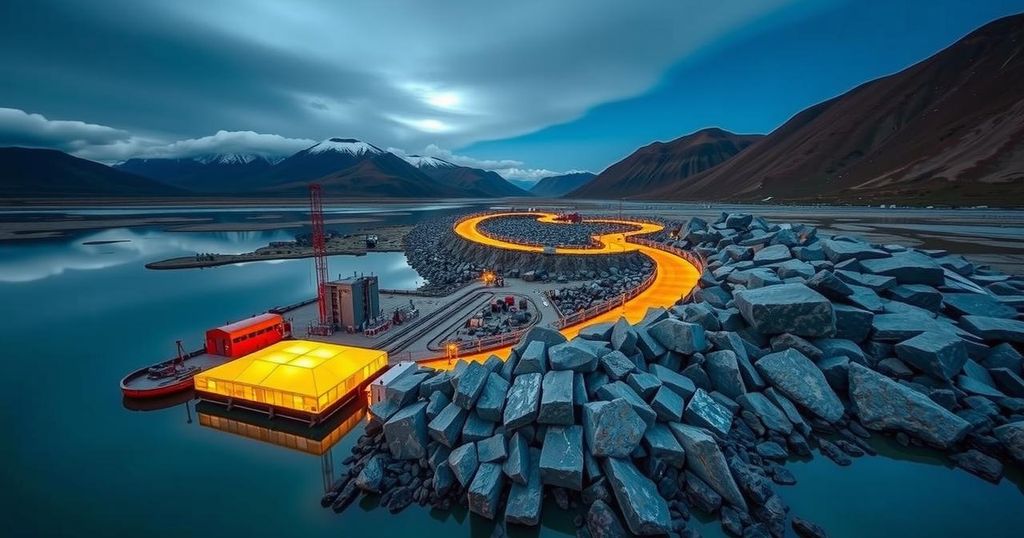Companies
ACQUISITION, ALARCO, ALARCON, AMERICAN, ARGENTINA, ASIA, BOLIVIA, CBC, CHILE, CHINA, CUBA, EXPORT, FOREIGN INVESTMENT, INVESTMENT, LITHIUM, MEXICO, MINING, NORTH AMERICA, OMAR ALARCON, SOLAR POWER, SOUTH AMERICA, SOUTHWEST, TESLARATI, TRUMP, UNITED STATES, UYUNI, YLB
Leila Ramsay
0 Comments
China Invests $1 Billion in Bolivia’s Lithium Extraction Project
A Chinese consortium, CBC, has entered into a $1 billion agreement with Bolivia to build two lithium extraction plants in the Uyuni salt flat. Bolivia retains a 51% stake in the project, which aims to produce a total of 35,000 metric tons of lithium annually. This partnership is significant for China’s electric vehicle supply chain but faces potential regulatory challenges in North America under the new U.S. administration.
In a significant investment endeavor, a Chinese consortium known as CBC has formalized an agreement with the Bolivian government to initiate lithium extraction operations. This partnership entails an investment of at least $1 billion and the construction of two extraction facilities located in Bolivia’s Uyuni salt flat, which lies at the heart of the lithium triangle shared by Bolivia, Chile, and Argentina.
The Bolivian government will retain a 51% stake in the CBC’s lithium extraction operations, thus allowing for substantial local involvement. According to Omar Alarcon, the head of Bolivia’s state-owned lithium company, YLB, the project is projected to yield approximately 35,000 metric tons of lithium per annum. Specifically, one plant will produce 10,000 tons of lithium carbonate annually, while the other is designed to generate 25,000 tons of battery-grade lithium carbonate.
Mr. Alarcon indicated that the extraction techniques to be employed are based on CBC’s proprietary technology, which will be implemented at the consortium’s own expense and risk. Notably, CATL, a prominent battery supplier, is expected to be part of this consortium. This strategic move is anticipated to position Chinese electric vehicle (EV) manufacturers advantageously within the North American market. However, concerns about potential regulatory changes under the incoming U.S. administration led by President-elect Trump could complicate China’s supply chain dynamics in North America.
While CATL remains optimistic regarding its expansion plans in the United States, the broader implications of these investments and the geopolitical landscape warrant close attention.
The agreement between CBC and the Bolivian government is particularly significant within the context of the growing global demand for lithium, a crucial component in battery production for electric vehicles. Bolivia’s Uyuni salt flat is noted for its vast lithium reserves, contributing to the region’s status as a critical player in the global lithium market. This partnership highlights China’s strategy to secure essential resources while also underscoring Bolivia’s efforts to benefit economically from its natural resources. The collaboration not only aims to bolster Bolivia’s lithium production capacity but also enhances China’s influence in the fast-expanding electric vehicle market.
The collaboration between the Chinese consortium CBC and the Bolivian government marks a pivotal moment in the development of Bolivia’s lithium industry, with a substantial investment aimed at boosting lithium extraction capabilities. The expected production outputs from the two planned facilities could significantly affect the global lithium supply chain, especially in the context of rising demand from electric vehicle manufacturers. However, the uncertain geopolitical climate in North America could pose challenges for the future of this initiative.
Original Source: www.teslarati.com




Post Comment